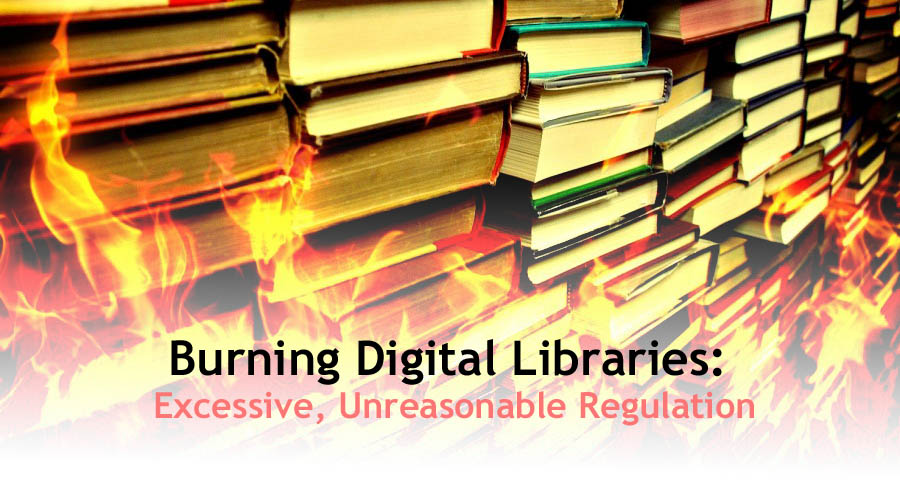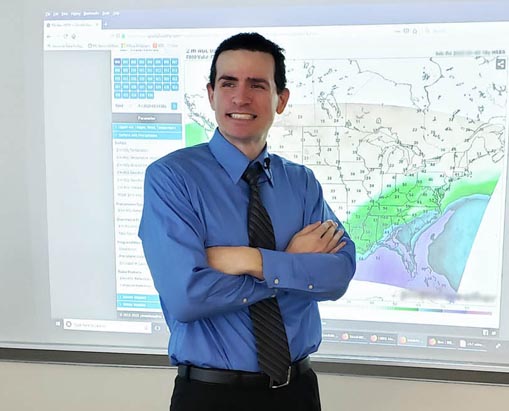Unreasonable, excessive federal accessibility regulation destroying valuable academic content

The destruction of massive amounts of valuable free public data is the end result of overregulation in higher education. What was essentially the updated language of the Americans with Disabilities Act of 1990 has turned into a heavy burden on overworked professors, academic departments, and a major reason why free public educational content is currently under threat. This is all happening because a flawed standard was created to ensure anything public was accessible to those with vision and hearing impairments. However, America’s ridiculous litigious culture is once again harming science and education. We should work to make items more accessible, but not involve any form of what is essentially destroying libraries, burning books, and deleting data to occur.
Burning Down Digital Libraries
The library is an important source of knowledge and power. Although we once had to go to a physical location to read paper books, the modern library has shifted to a digital world. Despite digital information popularity, the general idea is the same: access and share information. A majority of the world directly benefits from free public educational data, not limited to university websites. However, our knowledge resources are under threat from unreasonable, flawed regulations that might seem to mean well on a surface-level.
Recently, Inside Higher Ed published a disturbing story about how the University of California is responding to accessibility orders from the Department of Justice. Yes, that’s right, the DOJ has forced a university to basically burn down its digital library because not every single person on Earth can see or hear it. On March 15, 2017, the university will delete more than 20,000 audio and video files from its web platform. There’s so much educational data being digitally burned that it will take them several months to do it.
Two people have basically caused the burning down of a valuable digital library. Forget the millions of people free educational information benefits. This is just another example of completely unreasonable, irrational policy that is common within US culture these days. There are many other colleges experiencing the same issues and instead of dealing with compliance they just throw away academic content. We must make sure destroying publicly available information doesn’t become a usual trend.
Is it reasonable to destroy an entire library because someone can’t see or hear something in the library? Should a physical library with paper books destroy all books that don’t come with an audio tape transcript for the visually impaired? Why should reason and logic not apply to all educational content?
Many other colleges are pressuring professors to destroy educational work because of flawed accessibility regulations. Academic departments are worried that they will face huge fines, if they don’t pay millions or just delete the content. The issue may become much more complicated as some corporations might begin to use existing accessibility regulations to force colleges to buy their accessibility products and educational content, essentially forcing a monopoly of textbook publishers under the guise of meeting federal compliance standards. This has been going on for a few years, resulting in destroying large amounts of educational content. Existing accessibility regulations create an unreasonable burden on professors.
The Americans with Disabilities Act (ADA) and section 504 of the Rehabilitation Act apply to almost all colleges, universities, and trade schools. These regulations build on older themes that there are now more students with documented disabilities. The idea was to accommodate them by making materials more accessible in a timely matter as well as setting a standard for all of this to happen as an organizational process. However, implementing this in its current form is very difficult for colleges.
For example, a professor can create lecture slides and a lecture video for a course. If the lecture slides and video do not have closed captioning, transcripts, and the ability to run those features, it may be considered as not in compliance with ADA. This is not an easy fix because the professor is already under a tremendous burden to create the materials, update them, and deliver the course. A professor’s job is especially difficult as it is, especially for demanding courses within science, technology, engineering, and mathematics. The professor doesn’t typically have the time or resources to go through every single piece of the course and type out closed captioning and a transcript. Further, the professor may not have HTML skills to build-in alternative context tags. All of these pieces of extra work cost time and money. Imagine a course that is constantly updating its materials. The constant updating of materials means that the transcript and closed captioning would have to be updated every semester. This is just not reasonable or possible, in many cases.
The truth is much of the existing educational information on the internet is not exactly visible or audible to every single person on Earth with a hearing or visual impairment. The real challenge is improving this fact, not destroying the priceless educational information. Just because we can’t make every bit of it compliant to ADA doesn’t mean we destroy everything. What priceless educational information might you find online? Just about anything, including lecture videos, guides, accounts, data sets, healthcare information, demographics, geologic data, audio clips, PDFs, and so much more. There are multiple file types, graphics, and video formats. There is no way to make every single bit of it compliant at any single university because it is not centralized, in the same format, or language. However, end-user software, installed on the end-user’s browser might make this somewhat possible.
Despite reason and logic, many are being forced to just forget about using their own high-quality lecture materials and opt for cookie-cutter course materials. The problem with cookie-cutter course materials includes the fact that they are often of poor quality, not accurate, outdated, very thin in content, provide little value to the course, and because they are always the same for everyone, cheating is rampant.
We should do what we can – within reason – to accommodate students with diverse needs and disabilities. Accommodations should be reasonable and professors should have input as to what is reasonable, how policies are implemented, and speak up as to how damaging and backwards deleting massive amounts of valuable educational data is to the public.
The burden is put on the professor and school, instead of a comprehensive approach that could focus more on the actual end user. The end user could benefit from special software installed on his/her end, rather than change billions of pieces of information. Instead of deleting 20,000 educational files, special software could have been installed on the two complainants’ computer system. Unfortunately, everyone must now suffer.
Perhaps the solution might involve rolling upgrades and modifications, instead of gutting priceless educational materials. Changes take time and this must be written into the laws in a reasonable way. Professors should be the ones intimately involved in forming and implementing regulations that directly impact higher education delivery.
More about author.
